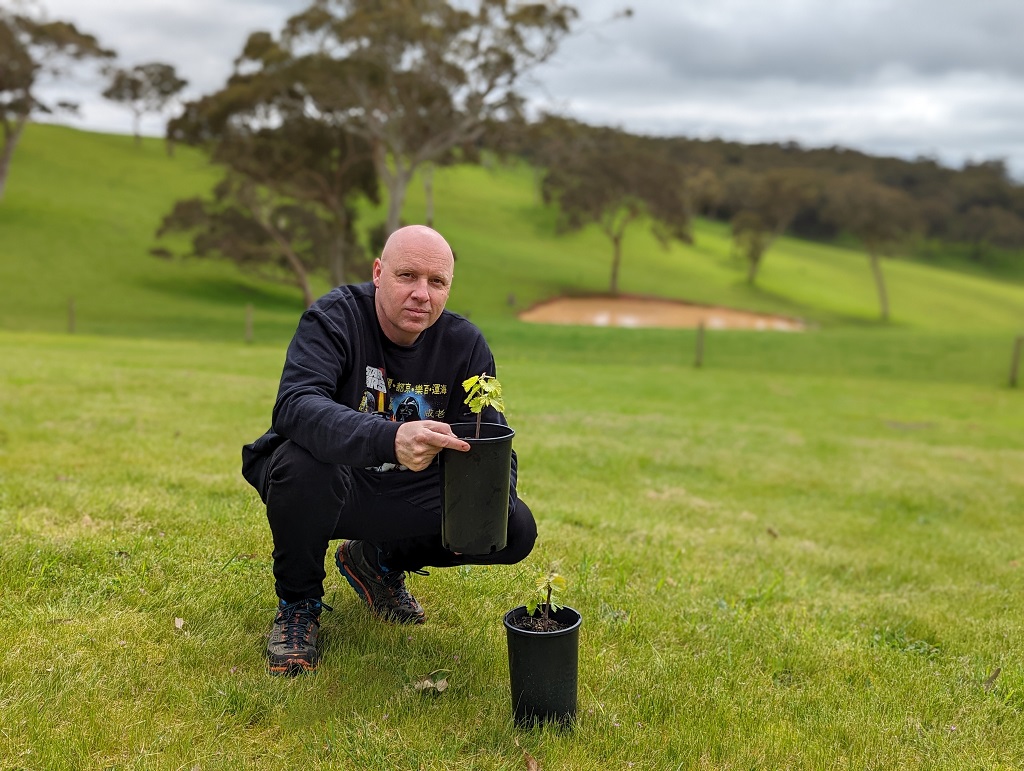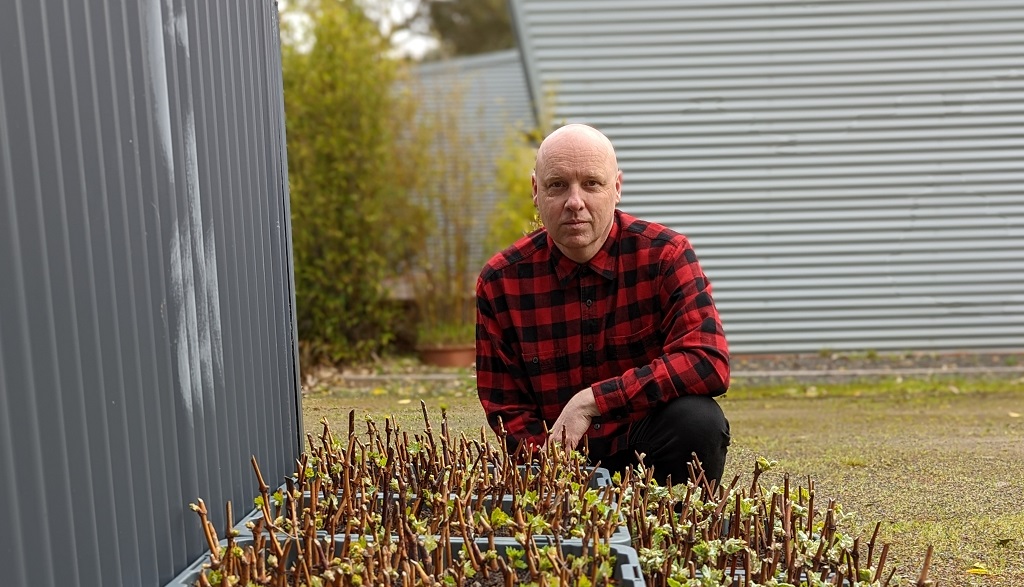Alexander Copper is currently propagating Cypriot vines with the aim of planting 1000 in how own vineyard next year. Photo Phuong Thuy Nguyen
In recent years there’s been a fascination in the wine industry with the idea of low intervention alternative varieties. Spearheading this charge has been Alexander Copper, a Clare Valley based viticulturist who has been studying the viability of growing vines without water. Harrison Davies spoke with him about his work to date and what’s to come.
Alexander Copper is getting ready for a tour of Europe. Chasing his dreams of cultivating low intervention grapes in Australia, Copper has recently been awarded a Nuffield Scholarship to supercharge his studies.
The Clare Valley based viticulturist has spent his career investigating the viability of eastern European and Mediterranean winegrape varieties that grow in water-scarce environments.
Following the completion of his PHD, in which he delved into the ins and outs of drought tolerant grape varieties, Copper is looking to further his research with the scholarship.
The Nuffield Scholarship is presented to agricultural, horticultural and viticultural researchers who specialise in any field concerning production.
Copper received $30,000 that will now go toward his travels and research and he said he was flattered to have received the recognition.
“I’m hugely grateful for the fantastic opportunity – I’ve actually applied for the scholarship a couple of times,” he said.
“The first time was in 2017, just before I started my PhD and I probably wasn’t fully aware of what it entailed and the scope of what’s involved. I didn’t end up getting it.
“The following year Martin Gransden from Orange got through with quite a similar project going to Greece and Armenia and Georgia.
“So after he did his tour, I was really keen to apply again after I finished my PhD and not necessarily replicate what he’d done, but try and go to different areas and look at similar themes.”
Copper sees alternative varieties as part of Australia’s future in wine, and this love for alternative varieties has guided his research.
“That got me interested in hot climate varieties, and in particular the ones from Cyprus, and I came back to Australia and looked to try and import some. Along the way, I decided to turn it into a PhD and study project.”
The wine bug
Copper’s journey with wine began in the Eden Valley around 20 years ago.
During his degree in Oenology, he met with a visiting lecturer from Germany and decided to pursue the research side of grapegrowing following conversations with him.
Copper said that his goal, ever since his early studies, was to be able to grow grapes without water.
“My goal was to dry grow a vineyard; they were doing some work in Germany with breeding different varieties,” Copper said.
“I got interested in the research side of things then and ended up going to Germany in 2012 and spent a vintage at that institute and learned a bit about different German varieties.
“I came back and decided I was going to move to Tasmania.”
Living in the Barossa had helped to sow the seeds of interest in alternative varieties, where amongst the vines of Shiraz and cabernet, he thought there was a better way.
Copper said he didn’t want to be a contrarian, but that it didn’t make sense that the Australian wine industry was so Shiraz-centric.
“I was just interested in exploring the ‘other’ for a long time. We’ve been told by the French that there are 15 varieties and that’s it, but there’s a whole world of varieties out there,” he said.
His research eventually lead him to Cyprus, where he began to find grapes growing in conditions that were very similar to those in Australia.
Most notably, he first found a white variety that thrived in the hot Cypriot sun called Xinisteri.
“That was a white variety that would always ripen at the end of harvest in the first couple of years,” Copper said.
“After about the third year, I realised that there was something going on in this really hot, dry climate, that this white variety was able to ripen up all through summer and be the last one to be harvested.
“That got me interested in hot climate varieties, and in particular the ones from Cyprus, and I came back to Australia and looked to try and import some. Along the way, I decided to turn it into a PhD and study project.”
Copper said that he thought alternative varieties would have a bigger future in Australia because they simply grow better in the climate, especially in a changing climate.
“I think there’s always going to be a place for the traditional varieties of Shiraz and Cabernet and Chardonnay and Sauvignon Blanc, they’re always going to be there,” he said.
“But as we’ve been experiencing with climate change, we’re not always going to be able to grow them in the areas we have been growing them.
“It’s not just me, there are a lot of lots of growers messing around with varieties from Italy and Spain and Georgia.
“I think, for the moment, it’s always going to be a bit niche. But it’s definitely going to grow into the future, particularly if you want to grow grapes in places like the Riverland or the Riverina.
“Without irrigation, you’re not going to grow much at all anyway. But if we didn’t have varieties that use less of that irrigation, then that’s only going to be a benefit to the businesses there.”
Copper said he was looking forward to returning to Cyprus to continue his research and to expand his studies to neighbouring parts of Europe.
“[I’m] definitely getting back to Cyprus. The two varieties I looked at were two of about 14 indigenous Cypriot varieties, which have great potential.
“I would like to see one which, since starting my research, has seen a lot more growers turning to their indigenous varieties; I just want to see how they’re going with those varieties.
“I’m also looking to Greece, and in particular Crete.
“I think Crete has a very similar environment and climate to Cyprus and South Australia and they’ve got another 20 odd indigenous varieties that grow amazingly well there as well.
“And then one place I’ve never been to which I’m really keen to get to is Turkey; there are some really interesting things coming out of Turkey in terms of rare indigenous varieties.”

Coming back home
Copper’s experiments with the Cypriot varieties have already begun in his vineyard, located in Auburn in the Clare Valley.
He said that he was aiming to cultivate a whole vineyard worth of Australian-grown vines so that he could begin learning how the grapes react to Australian conditions and how they work in an Australian wine setting.
After receiving cuttings from Europe, he is now working alongside other growers to create enough material to work from.
“I bought a piece of land in Clare Valley, in Auburn. And we’re propagating the material up at the moment,” he said.
“When you import something, you basically you get one vine. Once it’s gone through quarantine, that’s all they give you. From that one vine, you have to propagate out to roughly 2000 vines per hectare and we’re up to about 700 vines at the moment.
“I’m hoping to have enough to plant at least 1000 next year and I’m working with an industry partner as well in the Barossa. He’s going to plant 1000.
“We just want to do some trials, hopefully in conjunction with Adelaide Uni, where we’re just comparing the two regions and looking at different levels of irrigation, how the varieties are performing in those regions without irrigation.”
Copper has had to work around challenges with weather in the initial years of his research, namely the increased precipitation provided by the La Niña weather patterns over the past year.
It goes without saying that it’s hard to learn about dry growing vines when there is much higher than average rainfall.
“When we did it last year, in 2021, when we were doing the pots of experiments at the uni, we did have trouble with it not being hot enough,” Copper said.
“It was a combined heat/drought study. So having them in pots, we were still able to expose them to different levels of water, which gave us an idea of how they performed, but we definitely didn’t have the heat that we had in Cyprus.
“We tried to replicate that in Australia; being a La Niña year [it] wasn’t perfect, but it still gave us an insight.
“It’s not about me just making these varieties for research, it’s about the long term, giving back to the industry and getting these varieties out into different parts of Australia and seeing how they perform.
“It will take a few years, but it’s definitely on the cards of what we want to do for the wine industry.”
This article was originally published in the November 2022 issue of the Australian & New Zealand Grapegrower & Winemaker. To find out more about our monthly magazine, or to subscribe, click here!
















